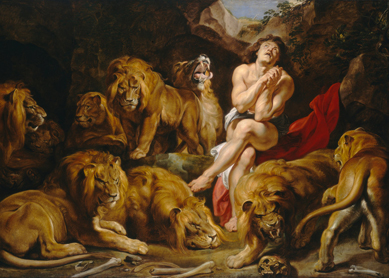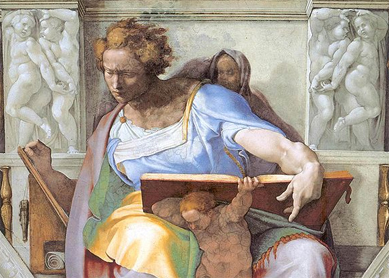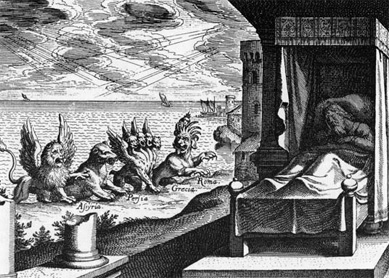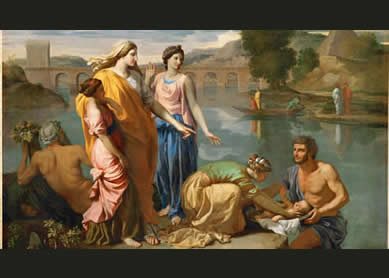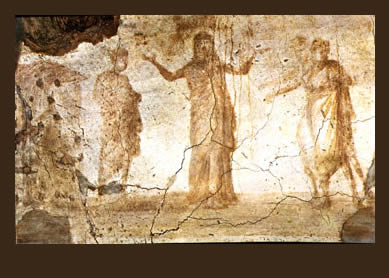Daniel in the lions’ den is certainly one of most well-known stories in the Hebrew Bible. The combination of political intrigue, civil disobedience, and Daniel’s steadfast faith and deliverance from an unjust and gruesome punishment is the stuff of a good Law and Order episode. While the adventures of Daniel and his friends are inspiring narratives of faith and heroism and excellent tales of moral and spiritual inspiration, they also provide important insights concerning faith, politics, and spirituality.
What does Mahatma Gandhi have to do with Daniel 6?
Daniel is most often identified as a person of character, a man of resolute faith, and a paragon of virtue and morality. Evidence of wide interest in the Daniel tradition can be found in the numerous manuscript portions found among the Dead Sea Scrolls, as well as among later written traditions such as the story of Susanna, where Daniel becomes a defender of a powerless woman falsely accused by leading religious officials of the community. This influence continues in the modern era. For example, Mahatma Gandhi was impressed with Daniel’s personal piety and commitment to prayer but was even more inspired that Daniel refused to change his practice of praying in front of an open window even after that behavior was outlawed. Gandhi’s strategies of respectful disobedience, which he often referred to as passive resistance, formed the backbone of his resistance campaigns for social and political change in South Africa and India. Gandhi wrote, “When Daniel threw open his doors in defiance of the laws of the Medes and Persians which offended his conscience, [he] meekly suffered the punishment for his disobedience, he offered satyagraha [truth force] in its purest form.”
%%Martin Luther King Jr. in his famous “Letter From Birmingham Jail” makes reference to a parallel story in Dan 3 where Daniel’s friends Shadrach, Meschach, and Abednego are thrown into the fiery furnace for refusing to obey the laws of King Nebuchadnezzar on the grounds that a higher moral law was at stake. Recent interpreters of the Daniel stories highlight this resistance to unjust imperial political power found in these narratives, expanding the focus on Daniel from an exemplar of personal faith and piety into a more systematic critique of unjust political and social systems. Daniel’s refusal to obey the king’s laws and his willingness to suffer the consequences help expose illegitimate use of political authority and the need for subversive behavior to change unjust laws. The miraculous deliverance from the lion’s den highlights the divine approval and protection for such behavior. Gandhi’s interpretation of Dan 6 helps readers move from a pious appreciation of Daniel’s individual behavior to an appreciation of the critique and resistance of unjust laws through civil disobedience.
Does political intrigue in the Bible rival present-day Washington, Moscow, or Beijing?
Certainly it does, for politics is politics, no matter where or when. Dan 6 begins with King Darius’s appointment of 120 officials to rule his kingdom, along with three persons to oversee them. Daniel is one of the three overseers and soon distinguishes himself in his duties. Almost immediately his political colleagues conspire against Daniel and persuade the king to issue a law forbidding prayer to anyone but the king. Perhaps there is an element of prejudice toward an outsider and a foreigner holding such an important position. They obviously know that Daniel’s normal religious practice would be in violation of this new law. There is an element of comedy, or even satiric overstatement, in this story because 122 officials are portrayed as plotting and moving as a single group, coming to the king as one mass to initiate and approve the new law, and then to accuse Daniel of seditious behavior. Daniel continues his normal prayer practice and, because of his violation of the law, suffers the punishment devised by his political opponents and is thrown into the lions’ den. Some commentators note that in Babylonian traditions the lions’ den is symbolic of the political infighting that occurs among various individuals and groups fighting for recognition, control, and political power and influence. It does sound like an apt description of the Congress of the United States! While interpreters debate whether or not Daniel was thrown into an actual pit of lions, it is clear that the political process in this story could be described as a kangaroo court. Persons who actively resist those in power often face dire consequences. The various Occupy movements that emerged worldwide beginning in the Fall of 2011, for example, know all too well the dangers of challenging the existing status quo. Authorities often responded with police actions, destruction of encampments, and arrests, even though many of the protests were nonviolent in nature, often drawing upon insights from Gandhi and MLK Jr.
Bibliography
- Fewall, Danna Nolan. Circle of Sovereignty: Plotting Politics in the Book of Daniel. Nashville: Abingdon, 1991.
- Berrigan, Daniel. Daniel: Under the Siege of the Divine. Farmington, Pa.: Plough Publishing House, 1998.
- Smith-Christopher, Daniel. “Daniel” and “Additions to Daniel.” Pages 19-194 in vol. 7 of The New Interpreter’s Bible. Nashville: Abingdon Press, 1996.
